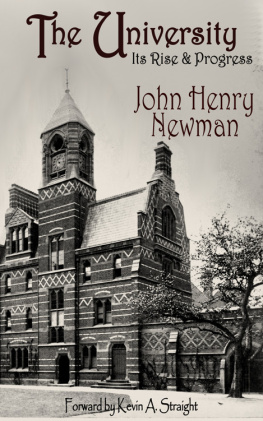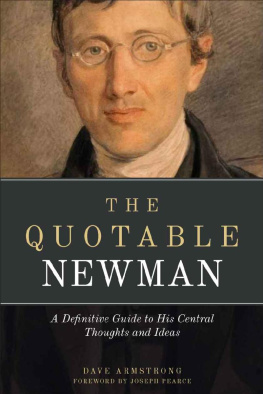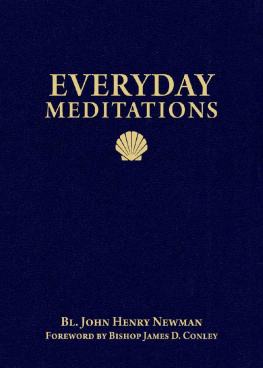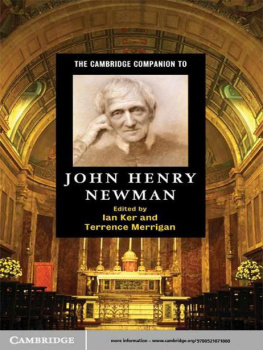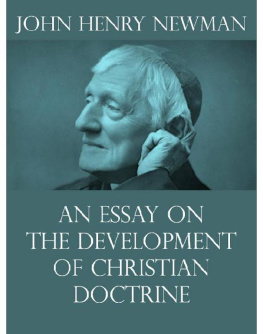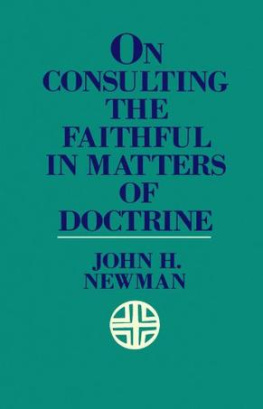John Henry Newman - The Idea of a University
Here you can read online John Henry Newman - The Idea of a University full text of the book (entire story) in english for free. Download pdf and epub, get meaning, cover and reviews about this ebook. year: 1982, publisher: University of Notre Dame Press, genre: Science. Description of the work, (preface) as well as reviews are available. Best literature library LitArk.com created for fans of good reading and offers a wide selection of genres:
Romance novel
Science fiction
Adventure
Detective
Science
History
Home and family
Prose
Art
Politics
Computer
Non-fiction
Religion
Business
Children
Humor
Choose a favorite category and find really read worthwhile books. Enjoy immersion in the world of imagination, feel the emotions of the characters or learn something new for yourself, make an fascinating discovery.
- Book:The Idea of a University
- Author:
- Publisher:University of Notre Dame Press
- Genre:
- Year:1982
- Rating:3 / 5
- Favourites:Add to favourites
- Your mark:
- 60
- 1
- 2
- 3
- 4
- 5
The Idea of a University: summary, description and annotation
We offer to read an annotation, description, summary or preface (depends on what the author of the book "The Idea of a University" wrote himself). If you haven't found the necessary information about the book — write in the comments, we will try to find it.
The Idea of a University — read online for free the complete book (whole text) full work
Below is the text of the book, divided by pages. System saving the place of the last page read, allows you to conveniently read the book "The Idea of a University" online for free, without having to search again every time where you left off. Put a bookmark, and you can go to the page where you finished reading at any time.
Font size:
Interval:
Bookmark:
UNIVERSITY
DEFINED AND ILLUSTRATED
I. IN NINE DISCOURSES DELIVERED TO THE CATHOLICS OF DUBLIN
II. IN OCCASIONAL LECTURES AND ESSAYS ADDRESSED TO THE MEMBERS OF THE CATHOLIC UNIVERSITY
BY
JOHN HENRY CARDINAL NEWMAN
NEW IMPRESSION
LONGMANS, GREEN, AND CO.
39 PATERNOSTER ROW, LONDON
NEW YORK, BOMBAY, AND CALCUTTA
1907
E-Book prepared by
Ignatius Press, San Francisco
2010
Hospes eram, et collegistis Me.
IN GRATEFUL NEVER-DYING REMEMBRANCE
OF HIS MANY FRIENDS AND BENEFACTORS,
LIVING AND DEAD,
AT HOME AND ABROAD
IN GREAT BRITAIN, IRELAND, FRANCE,
IN BELGIUM, GERMANY, POLAND, ITALY, AND MALTA,
IN NORTH AMERICA, AND OTHER COUNTRIES,
WHO, BY THEIR RESOLUTE PRAYERS AND PENANCE,
AND BY THEIR GENEROUS STUBBORN EFFORTS,
AND BY THEIR MUNIFICENT ALMS,
HAVE BROKEN FOR HIM THE STRESS
OF A GREAT ANXIETY,
THESE DISCOURSES,
OFFERED TO OUR LADY AND ST. PHILIP ON ITS RISE,
COMPOSED UNDER ITS PRESSURE,
FINISHED ON THE EVE OF ITS TERMINATION,
ARE RESPECTFULLY AND AFFECTIONATELY INSCRIBED
BY THE AUTHOR.
IN FEST. PRSENT.
B. M. V.
NOV. 21, 1852.
I. UNIVERSITY TEACHING
II. UNIVERSITY SUBJECTS
THE view taken of a University in these Discourses is the following:That it is a place of teaching universal knowledge . This implies that its object is, on the one hand, intellectual, not moral; and, on the other, that it is the diffusion and extension of knowledge rather than the advancement. If its object were scientific and philosophical discovery, I do not see why a University should have students; if religious training, I do not see how it can be the seat of literature and science.
Such is a University in its essence , and independently of its relation to the Church. But, practically speaking, it cannot fulfil its object duly, such as I have described it, without the Churchs assistance; or, to use the theological term, the Church is necessary for its integrity . Not that its main characters are changed by this incorporation: it still has the office of intellectual education; but the Church steadies it in the performance of that office.
Such are the main principles of the Discourses which follow; though it would be unreasonable for me to expect that I have treated so large and important a field of thought with the fulness and precision necessary to secure me from incidental misconceptions of my meaning on the part of the reader. It is true, there is nothing novel or singular in the argument which I have been pursuing, but this does not protect me from such misconceptions; for the very circumstance that the views I have been delineating are not original with me may lead to false notions as to my relations in opinion towards those from whom I happened in the first instance to learn them, and may cause me to be interpreted by the objects or sentiments of schools to which I should be simply opposed.
For instance, some persons may be tempted to complain, that I have servilely followed the English idea of a University, to the disparagement of that Knowledge which I profess to be so strenuously upholding; and they may anticipate that an academical system, formed upon my model, will result in nothing better or higher than in the production of that antiquated variety of human nature and remnant of feudalism, as they consider it, called a gentleman. Now, I have anticipated this charge in various parts of my discussion; if, however, any Catholic is found to prefer it (and to Catholics of course this Volume is primarily addressed), I would have him first of all ask himself the previous question, what he conceives to be the reason contemplated by the Holy See in recommending just now to the Irish Hierarchy the establishment of a Catholic University? Has the Supreme Pontiff recommended it for the sake of the Sciences, which are to be the matter, and not rather of the Students, who are to be the subjects, of its teaching? Has he any obligation or duty at all towards secular knowledge as such? Would it become his Apostolical Ministry, and his descent from the Fisherman, to have a zeal for the Baconian or other philosophy of man for its own sake? Is the Vicar of Christ bound by office or by vow to be the preacher of the theory of gravitation, or a martyr for electro-magnetism? Would he be acquitting himself of the dispensation committed to him if he were smitten with an abstract love of these matters, however true, or beautiful, or ingenious, or useful? Or rather, does he not contemplate such achievements of the intellect, as far as he contemplates them, solely and simply in their relation to the interests of Revealed Truth? Surely, what he does he does for the sake of Religion; if he looks with satisfaction on strong temporal governments, which promise perpetuity, it is for the sake of Religion; and if he encourages and patronizes art and science, it is for the sake of Religion. He rejoices in the widest and most philosophical systems of intellectual education, from an intimate conviction that Truth is his real ally, as it is his profession; and that Knowledge and Reason are sure ministers to Faith.
This being undeniable, it is plain that, when he suggests to the Irish Hierarchy the establishment of a University, his first and chief and direct object is, not science, art, professional skill, literature, the discovery of knowledge, but some benefit or other, to accrue, by means of literature and science, to his own children; not indeed their formation on any narrow or fantastic type, as, for instance, that of an English Gentleman may be called, but their exercise and growth in certain habits, moral or intellectual. Nothing short of this can be his aim, if, as becomes the Successor of the Apostles, he is to be able to say with St. Paul, Non judicavi me scire aliquid inter vos, nisi Jesum Christum, et hunc crucifixum. Just as a commander wishes to have tall and well-formed and vigorous soldiers, not from any abstract devotion to the military standard of height or age, but for the purposes of war, and no one thinks it any thing but natural and praiseworthy in him to be contemplating, not abstract qualities, but his own living and breathing men; so, in like manner, when the Church founds a University, she is not cherishing talent, genius, or knowledge, for their own sake, but for the sake of her children, with a view to their spiritual welfare and their religious influence and usefulness, with the object of training them to fill their respective posts in life better, and of making them more intelligent, capable, active members of society.
Nor can it justly be said that in thus acting she sacrifices Science, and, under a pretence of fulfilling the duties of her mission, perverts a University to ends not its own, as soon as it is taken into account that there are other institutions far more suited to act as instruments of stimulating philosophical inquiry, and extending the boundaries of our knowledge, than a University. Such, for instance, are the literary and scientific Academies, which are so celebrated in Italy and France, and which have frequently been connected with Universities, as committees, or, as it were, congregations or delegacies subordinate to them. Thus the present Royal Society originated in Charles the Seconds time, in Oxford; such just now are the Ashmolean and Architectural Societies in the same seat of learning, which have risen in our own time. Such, too, is the British Association, a migratory body, which at least at times is found in the halls of the Protestant Universities of the United Kingdom, and the faults of which lie, not in its exclusive devotion to science, but in graver matters which it is irrelevant here to enter upon. Such again is the Antiquarian Society, the Royal Academy for the Fine Arts, and others which might be mentioned. This, then, is the sort of institution, which primarily contemplates Science itself; and not students: and, in thus speaking, I am saying nothing of my own, being supported by no less an authority than Cardinal Gerdil. Ce nest pas, he says, quil y ait aucune vritable opposition entre lesprit des Acadmies et celui des Universits; ce sont seulement des vues diffrentes. Les Universits sont tablies pour enseigner les sciences aux lves qui veulent sy former; les Acadmies se proposent de nouvelles recherches faire dans la carrire des sciences. Les Universits dItalie ont fourni des sujets qui ont fait honneur aux Acadmies; et celles-ci ont donn aux Universits des Professeurs, qui out rempli les chaires avec la plus grande distinction.
Font size:
Interval:
Bookmark:
Similar books «The Idea of a University»
Look at similar books to The Idea of a University. We have selected literature similar in name and meaning in the hope of providing readers with more options to find new, interesting, not yet read works.
Discussion, reviews of the book The Idea of a University and just readers' own opinions. Leave your comments, write what you think about the work, its meaning or the main characters. Specify what exactly you liked and what you didn't like, and why you think so.

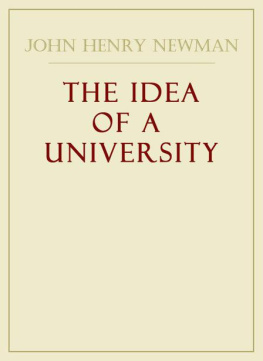
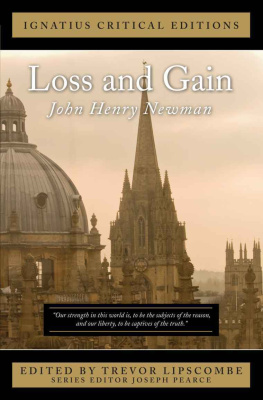
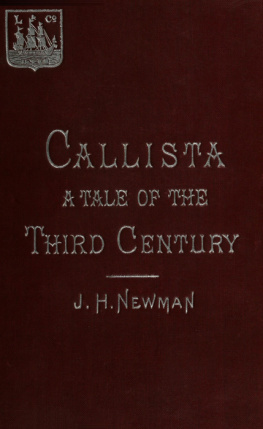
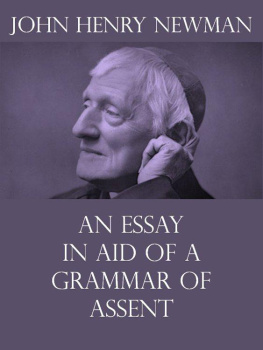
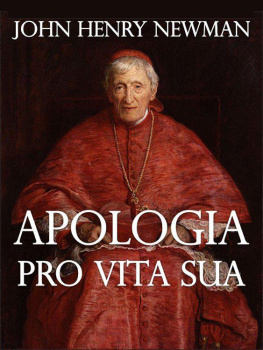
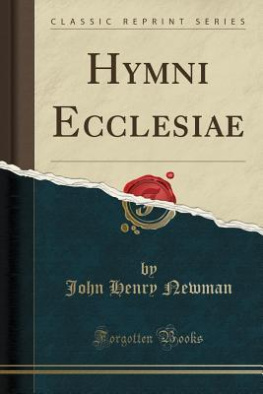
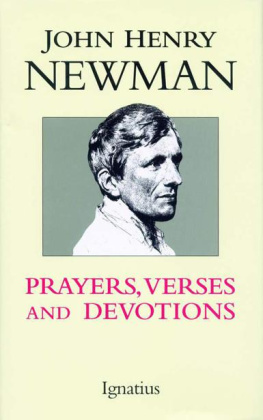
![Blessed John Henry Newman - Blessed John Henry Newman Collection [26 Books]](/uploads/posts/book/371011/thumbs/blessed-john-henry-newman-blessed-john-henry.jpg)

